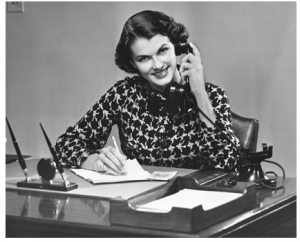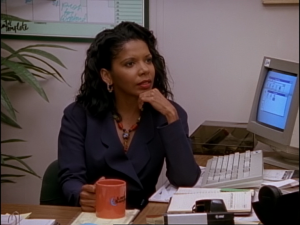Secretarial Work and Women’s Clubs: Finding Women in the Archive
 Before Console-ing Passions Boston 2012, I had not considered the necessary connection between the archive, archival research, and feminism. I admit this hesitantly because now it seems like the most obvious connection in the world. I was eager for this enlightenment as I am now deeply entangled (in a good way!) in government and corporate documents from the late 1940s to the early 1950s. Now that I have begun to think through the perils of studying these documents without a feminist perspective, I have a couple of observations and insights I would like to share.
Before Console-ing Passions Boston 2012, I had not considered the necessary connection between the archive, archival research, and feminism. I admit this hesitantly because now it seems like the most obvious connection in the world. I was eager for this enlightenment as I am now deeply entangled (in a good way!) in government and corporate documents from the late 1940s to the early 1950s. Now that I have begun to think through the perils of studying these documents without a feminist perspective, I have a couple of observations and insights I would like to share.
Loyal Secretaries
Anyone who has ever surveyed the papers of the “great men” who populate the archives of NBC, the NAB, and the FCC have surely read countless letters to and from executives, lobbyists, and civil servants. That is admittedly one of the dazzling aspects of doing this work. What can beat finding redacted letters from J. Edgar Hoover to the chairman of the FCC? (Well, finding uncensored letters, but that’s another matter.) What I came to realize, after searching through both mundane and thrilling letters and memos, was that I was reading documents thanks to the labor of female secretaries. I want to know more about these women, but I worry that their usefulness to history is tied solely to the men who employed them.
We have seen this troublesome situation throughout pop culture. I didn’t love the recent film J. Edgar, but I was fascinated by the role of Hoover’s secretary, Helen Gandy. This was the person who most likely typed some of the letters I had come across in my research.
When I watch the film Quiz Show, and I do watch it often, the brief scene in which Robert Kintner’s secretary is rude to Richard Goodwin is a great moment because it reveals her protectiveness of Kintner—over his position and his time. She is listed only as “Kintner’s Secretary” on imdb.com, and I wonder if she was named in the book that the film is based on. Or was she just a convenient tool for Paul Attanasio, the film’s screenwriter? An overweight bitch to throw in as symbol of network haughtiness?
The fraction of letters I have been able to index thus far have been typed up by Helen A. Fruth, secretary to Justin Miller, who steered the NAB through the transition to television. While Fruth is the anonymous typist in many cases, in others she is the author who corresponds with domestic and international figures to coordinate Miller’s schedule and alert them as to his whereabouts. She managed Miller’s professional life and is an agent in the story of the NAB, but she is most certainly sidelined. Her labor and her words imbue every document, but her name isn’t on the archival box. What stories could she tell if her correspondence were housed somewhere?
Women who Watch
Some of the most entertaining documents I have encountered are letters of complaint written by highly motivated viewers. When I was photographing these letters I was fixated on the content—the righteous indignation, the archaic standards, the vitriol—and not the authors. After the post-Console-ing Passions light bulb turned on, I went back through some of the letters that my invaluable research assistant, Catherine Martin, had indexed and transcribed. Once I was able to divvy up the authors according to their sex (many of the women identify themselves as Mrs. Husband’s Full Name), I was able to detect an intriguing pattern: the frequency with which women authored letters in groups.
Formal and informal women’s clubs protested TV content, expressed concerns, or relayed news of their passage of resolutions about TV content. These women enacted their citizenship not only by notifying the FCC of their thoughts on TV but by mobilizing around the issue in the first place. So far I have not encountered this same collective behavior coming from the men. Was it necessary for women to show strength by expressing their opinions in groups? Does the lone female writer (the mother, the housewife) concerned about her children lack the status of a group of women devoting its time to the medium supposedly threatening the moral health of the country? The way in which women confronted the threat is infinitely more interesting to me than how they believed that threat manifested.
As I shape this research project into something whole and coherent, I’m optimistic about the ways in which I can merge the concerns of feminism with the more obscure archival documents that seem to want to exist as neutral and objective artifacts. Where are the women in the industrial and regulatory history of television? They’re there, and now—educated by some of the great presenters at Console-ing Passions 2012—I can see them.



